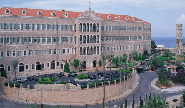
Events are unfolding across the region, while Lebanon remains on the sidelines, lacking a meaningful political presence in the reshaped Middle East.
Lebanese officials have been following, via the media, US President Donald Trump’s visit to Israel, the developments in Gaza, his Knesset address and the Sharm al-Sheikh summit. Official sources say these developments show that the “peace train” is moving in the region. Failing to join it could leave Lebanon alone, bearing the costs and remaining a battleground. President Joseph Aoun is fully aware of this reality, which is why he has sought to open a small window in the crisis with Israel by calling for a halt to military operations and initiating a path toward negotiations.
Sources emphasize that Aoun’s statements have reached regional and international observers. Yet these actors remain firm that any measures to control weapons must be tangible and effective to elicit a positive response from Israel. Otherwise, Lebanon risks being left to its fate on the sidelines of regional developments.
Western diplomatic sources have underscored that Lebanon must understand the message behind its exclusion from the summit. The country’s political leadership is urged to act decisively in confronting Hezbollah and Iran, whose interference continues to block Lebanon’s path toward peace and stability.
The sources pointed to lessons from Iraq, which managed to curb Iranian influence, prevent the Popular Mobilization Forces from interfering in its foreign policy and remain actively engaged in regional and international initiatives. Similarly, Syria, under President Ahmad al-Sharaa, is swiftly moving toward a security understanding with Israel that could pave the way for normalization, despite not being invited to the summit.
Crucially, these sources note that Hamas has stepped back from the military and political arena, intensifying pressure on Hezbollah and Iran. With fewer levers of influence, they are using their remaining power to keep Lebanon hostage to their continued refusal to accept stability and peace.
Western diplomatic sources stress that Lebanon’s opportunity to join the new regional trajectory is limited. The government is being urged to effectively implement the weapons control decision and confront Hezbollah’s actions, which undermine state authority. Failing to do so would signal an unwillingness to reclaim sovereignty and would prevent Lebanon from gaining the international community’s trust to play a meaningful role in the region.




Comments